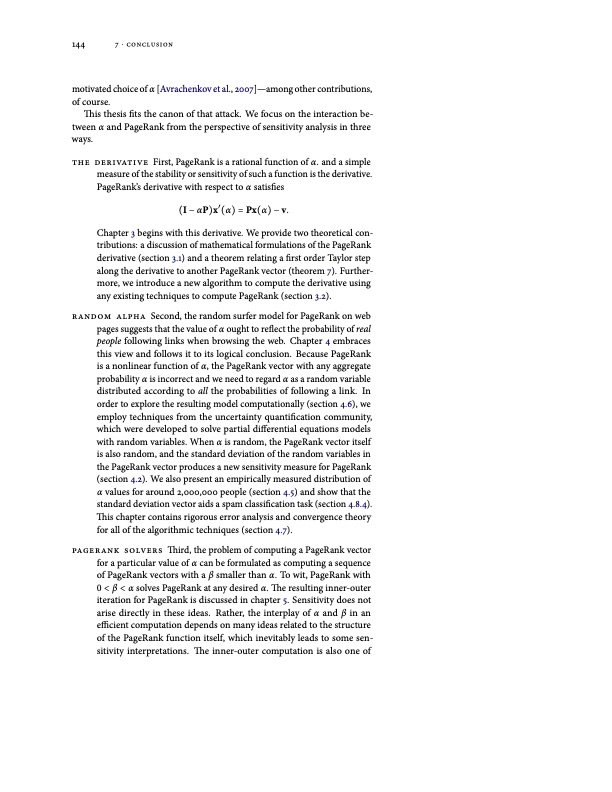
PDF Publication Title:
Text from PDF Page: 164
144 7 ⋅ conclusion motivated choice of α [Avrachenkov et al., 2007]—among other contributions, of course. This thesis fits the canon of that attack. We focus on the interaction be- tween α and PageRank from the perspective of sensitivity analysis in three ways. the derivative First, PageRank is a rational function of α. and a simple measure of the stability or sensitivity of such a function is the derivative. PageRank’s derivative with respect to α satisfies (I − αP)x′(α) = Px(α) − v. Chapter 3 begins with this derivative. We provide two theoretical con- tributions: a discussion of mathematical formulations of the PageRank derivative (section 3.1) and a theorem relating a first order Taylor step along the derivative to another PageRank vector (theorem 7). Further- more, we introduce a new algorithm to compute the derivative using any existing techniques to compute PageRank (section 3.2). random alpha Second, the random surfer model for PageRank on web pages suggests that the value of α ought to reflect the probability of real people following links when browsing the web. Chapter 4 embraces this view and follows it to its logical conclusion. Because PageRank is a nonlinear function of α, the PageRank vector with any aggregate probability α is incorrect and we need to regard α as a random variable distributed according to all the probabilities of following a link. In order to explore the resulting model computationally (section 4.6), we employ techniques from the uncertainty quantification community, which were developed to solve partial differential equations models with random variables. When α is random, the PageRank vector itself is also random, and the standard deviation of the random variables in the PageRank vector produces a new sensitivity measure for PageRank (section 4.2). We also present an empirically measured distribution of α values for around 2,000,000 people (section 4.5) and show that the standard deviation vector aids a spam classification task (section 4.8.4). This chapter contains rigorous error analysis and convergence theory for all of the algorithmic techniques (section 4.7). pagerank solvers Third, the problem of computing a PageRank vector for a particular value of α can be formulated as computing a sequence of PageRank vectors with a β smaller than α. To wit, PageRank with 0 < β < α solves PageRank at any desired α. The resulting inner-outer iteration for PageRank is discussed in chapter 5. Sensitivity does not arise directly in these ideas. Rather, the interplay of α and β in an efficient computation depends on many ideas related to the structure of the PageRank function itself, which inevitably leads to some sen- sitivity interpretations. The inner-outer computation is also one ofPDF Image | ALGORITHMS FOR PAGERANK SENSITIVITY DISSERTATION

PDF Search Title:
ALGORITHMS FOR PAGERANK SENSITIVITY DISSERTATIONOriginal File Name Searched:
gleich.pdfDIY PDF Search: Google It | Yahoo | Bing
Cruise Ship Reviews | Luxury Resort | Jet | Yacht | and Travel Tech More Info
Cruising Review Topics and Articles More Info
Software based on Filemaker for the travel industry More Info
The Burgenstock Resort: Reviews on CruisingReview website... More Info
Resort Reviews: World Class resorts... More Info
The Riffelalp Resort: Reviews on CruisingReview website... More Info
| CONTACT TEL: 608-238-6001 Email: greg@cruisingreview.com | RSS | AMP |